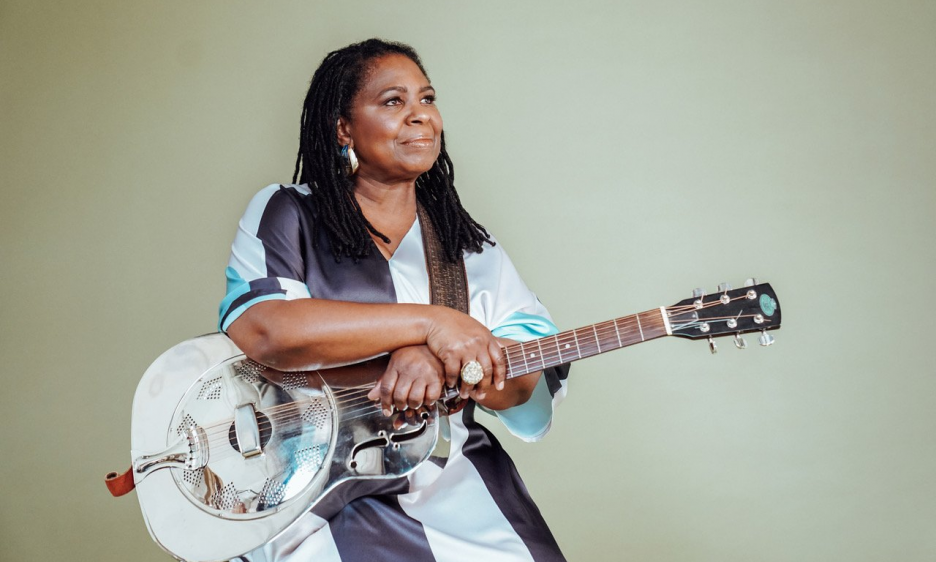Home » Jazz Articles » Catching Up With » Ruthie Foster Gets Her Moment At Sun
Ruthie Foster Gets Her Moment At Sun

Courtesy Jody Dominque
Where you are emotionally is everything.
—Ruthie Foster
"He told me, 'It's not age -you just have more miles than most right now,'" Foster recalls with a laugh. "That became the title, and the rest was about my life on the road."
Foster first picked up the guitar as a young girl in Gause, Texas, playing in church and soaking up gospel music alongside her family. After studying audio engineering in college, she joined the Navy, where she performed in a recruitment band.
"I wanted to do something other than music," she says of her Navy years. "I've been playing and performing since I was twelve, and I just turned sixty. That's a long time in music and entertaining, churches, communities, schools. The military was a way to get out of that small pond, see the world."
After her stint in the service, a development deal with Atlantic Records brought her to New York City, but she returned home to Texas when her mother fell ill.
For Mileage, Foster wrote and recorded in Nashville with producer Tyler Bryant and his wife Rebecca Lovell of Larkin Poe. The sessions grew from casual conversations into something deeper, as Foster opened up about her experiences and found willing collaborators who could help shape those stories into songs.
"Tyler is very active, walks around with a guitar," Foster explains. "Rebecca sits on the couch, and I'm on the other end. We're just tossing ideas around. I think I had just come off tour. All three of us were always on tour, and we would come back and sit and write and then record downstairs in their house."
The album's soulful first single "Rainbow" speaks about letting love be love, a powerful statement from a queer Black female artist reflecting on her journey through life. "Six Mile Water" reaches back to Foster's roots, painting a picture of her childhood home near the Brazos River in Texas.
Foster also chose to reclaim Arthur "Big Boy" Crudup's "That's All Right," the song that launched Elvis Presley's career at Sun Records, by taking it back to its blues origins. The song's inclusion serves as both tribute and correction, acknowledging Crudup's often-overlooked role in rock and roll history while connecting Foster's modern blues with its foundational roots. "I learned how to play guitar by playing front-porch blues, what I call it here in Texas," she says. "Lightnin' Hopkins, that's all front-porch blues. Everybody who plays guitar here in Texas plays like that. We wanted to bring it back to the original version of that song, to remind people where it came from."
Foster's style draws from the Black musical traditions of Texas. Growing up, she stood out as a young Black girl with a guitar in a choir scene dominated by pianos, but her grandmother's vocal coaching and encouragement from her mother and church community helped her recognize her own power as a songwriter and musician.
Foster balances roles as student and teacher. She speaks of time spent with mentors like Ruth Brown and Bonnie Raitt while making space for younger artists. She remembers sitting at Ruth Brown's feet during a recording session in Austin, listening to the legend talk about her unfulfilled dream of recording a gospel album for Dr. Martin Luther King Jr. These moments shaped how Foster works with others.
"I try to conduct myself by being open so that someone feels they can come up and talk," she says. "That was important to me when sitting on the couch with Rebecca, I wanted to hold space for her to open up and tell me what was happening [in her life]." The writing sessions built trust over time, with Foster introducing Lovell to artists she hadn't discovered yet, like Janis Ian. The cross-generational exchange gave depth to their collaboration, especially as Foster recognized in Lovell some of the same fire she once felt as a young musician finding her voice.
Years of experience inform her approach. "Friends will ask me, 'How do you know this stuff?'" Foster says. "And my only answer is, 'I've messed up enough. I've messed up a lot.' Those were my lessons, and I didn't get them right."
Now with five Grammy nominations, Foster creates while staying rooted in the musical traditions that shaped her. Back home in Austin, she dedicates time to raising money for fellow musicians who need help with healthcare or can't tour anymore. Whether performing at blues festivals in Europe or community fundraisers in Texas, she focuses on the emotional connection at the heart of her music.
"Every show makes me nervous," she admits. "But that's energy. A great voice teacher taught me that it's a good thing, it's just nerves, and it can be used for the show. You can use that to portray where you are emotionally, and where you are emotionally is everything."
At sixty, Foster writes with fresh clarity. Late at night in her Texas home, with train whistles sounding in the distance, she is still discovering new songs. "I'm basically just in this place where I'm writing about what's real to me," she says. "Hopefully someone else can relate to it, but meanwhile, I'm just getting it all out while I can."
Tags
Catching Up With
Ruthie Foster
Lawrence Peryer
United States
Texas
Austin
Sun Records
Atlantic Records
New York City
Rebecca Lovell
Larkin Poe
Arthur "Big Boy" Crudup
Elvis Presley
RUTH BROWN
Bonnie Raitt
Janis Ian
PREVIOUS / NEXT
Ruthie Foster Concerts
Support All About Jazz
 All About Jazz has been a pillar of jazz since 1995, championing it as an art form and, more importantly, supporting the musicians who make it. Our enduring commitment has made "AAJ" one of the most culturally important websites of its kind, read by hundreds of thousands of fans, musicians and industry figures every month.
All About Jazz has been a pillar of jazz since 1995, championing it as an art form and, more importantly, supporting the musicians who make it. Our enduring commitment has made "AAJ" one of the most culturally important websites of its kind, read by hundreds of thousands of fans, musicians and industry figures every month.
























